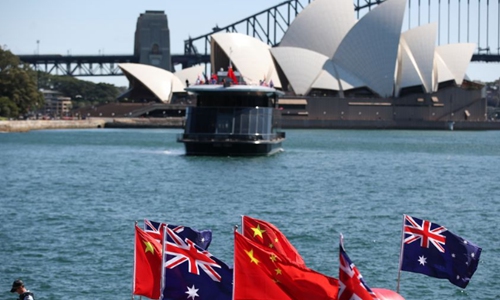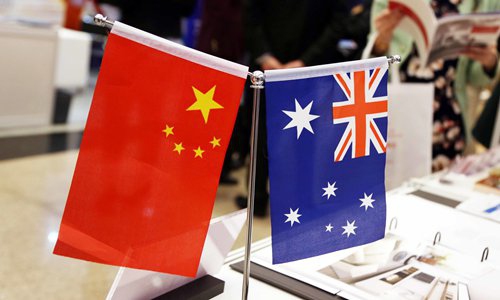
Chinese and Australian national flags are seen at an event in Sydney, Australia. File photo: Xinhua
The Chinese Ministry of Culture and Tourism released on Friday a statement warning its citizens not to travel to Australia due to a "significant increase" in racism against Chinese and Asian people.
However, Australian politicians seem to disagree with a travel alert warning issued by China. Australian Deputy Prime Minister Michael McCormack claimed that, "There hasn't been a wave of outbreaks of violence against Chinese people." Or, as the Tourism Minister Simon Birmingham put it, the warning has "no basis in fact."
Yet, their objections are feeble in the face of the facts. Even the Australian media outlets have repeatedly reported stories of Chinese-Australian or Asian-Australian people experiencing increased racist attacks across the country during the coronavirus pandemic, and the current Australian laws are not enough to protect the victims.
It is unlikely for those Australian politicians to overlook such overwhelming media coverage on increased racism, but political motives may probably make them turn a blind eye to it. To a certain extent, this is one of the main reasons why the China-Australia relations have reached the current stalemate. Australian politicians have always readily launched attacks against China even when they know clearly that their assertions are unjustified, because they are too easily swayed by US political attitude and too eager to win US favors.
Of course, Australia's nervousness about the travel warning is understandable, as it may deliver another major blow to its economy. China has been the largest source of international travelers to Australia. According to data from Tourism Research Australia, Chinese mainland travelers went up 1.2 percent year-on-year to 1.3 million in the year ended September 2019, with their expenditures up 6.8 percent to A$12.3 billion ($8.28 billion), representing over 27 percent of all spending by foreign travelers during the period.
Yet, it is Australia's unfriendly attitude, not the travel alert, that may really scare away Chinese tourists and students. From its push for a US-led inquiry into COVID-19 to its interference in the Hong Kong affair and the upcoming overhaul of its foreign investment rules that are expected to tighten scrutiny over foreign investment, Australian politicians are demonstrating their antipathy toward China.
The Australian economy has benefited a lot from the bilateral economic and trade cooperation with China, which is why the Chinese and Australian business communities still hope that their relationship could return to normal. But empty political rhetoric by Australian politicians would not be enough to improve the current stalemate in bilateral relations. It is what they do, not what they say, that really determines which direction China and Australia will go.
If Australia wants to retain the gain from its economic ties with China, it must make a real change to its current stance on China, or it will completely lose the benefits of Chinese consumers. The tourism loss may be just a tip of iceberg in its loss of Chinese interest.


